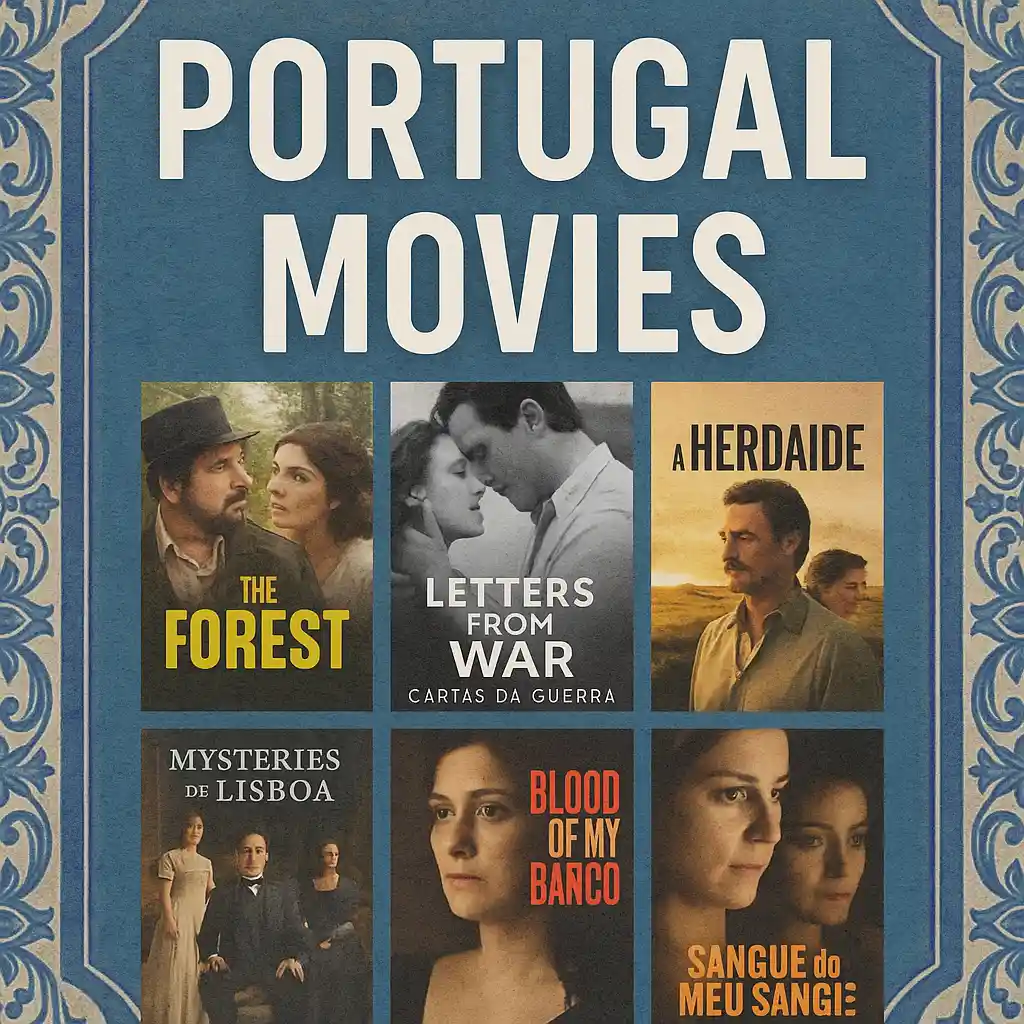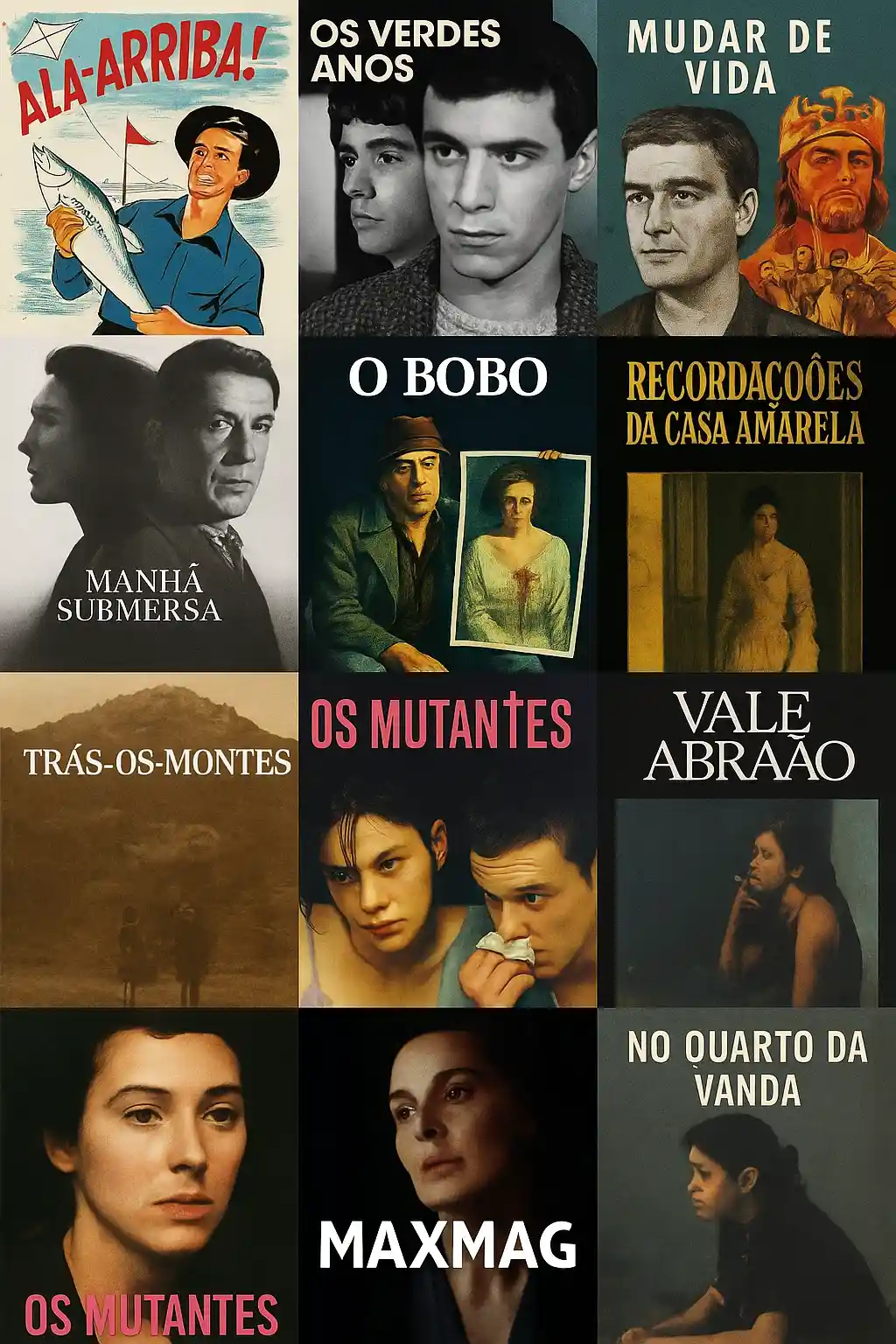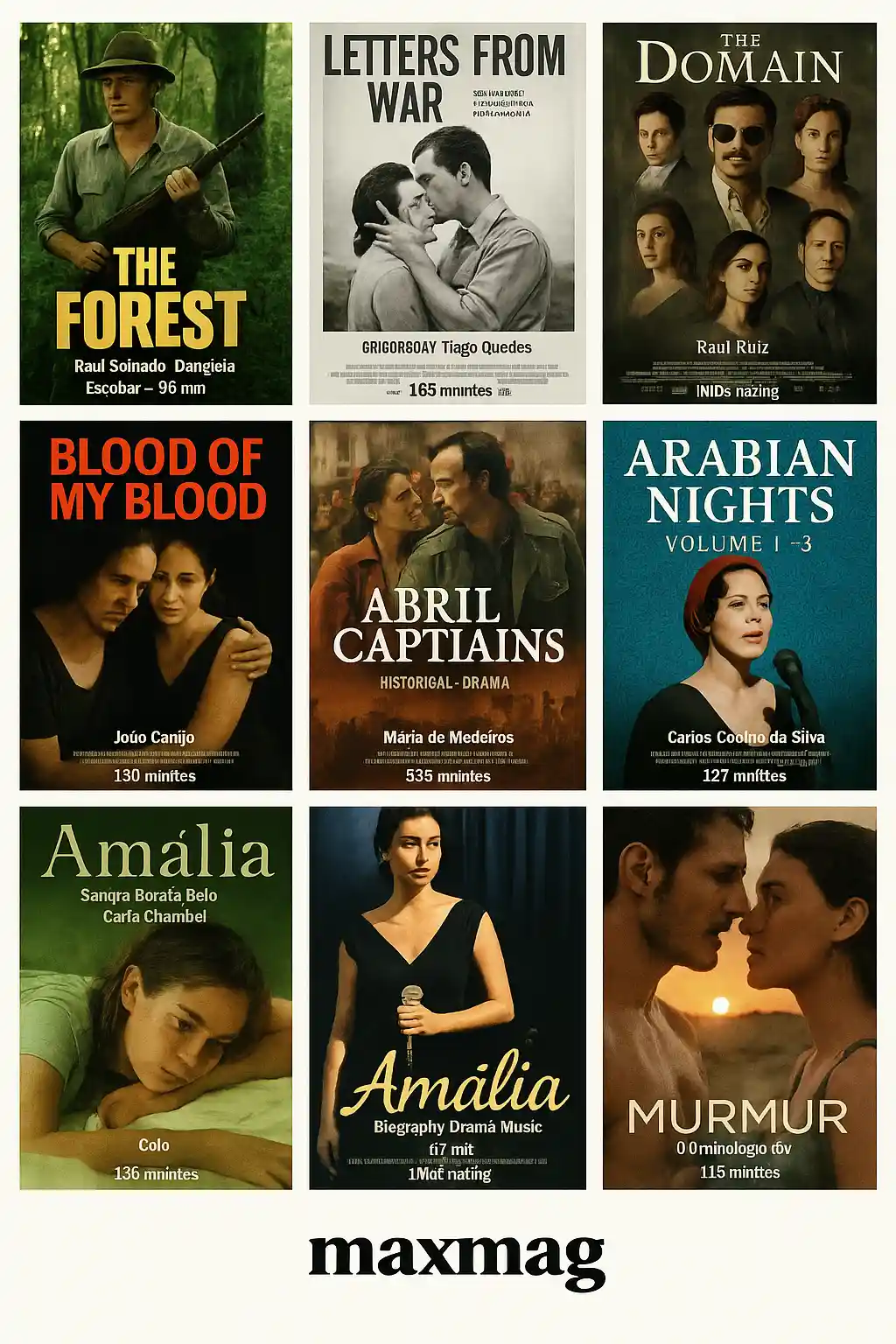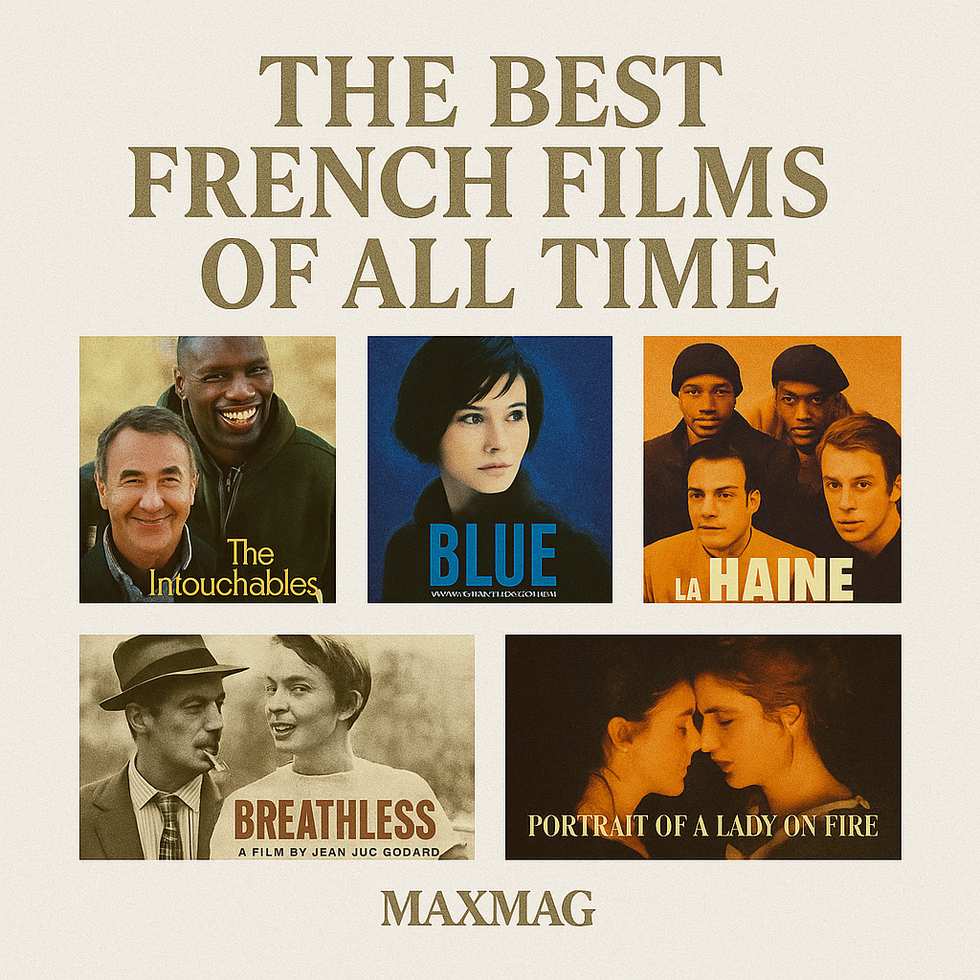
From hauntingly poetic dramas to boundary-pushing experimental films, Portugal movies have long embodied a quiet power in world cinema. With roots in Fado, saudade, and political upheaval, Portuguese filmmakers create stories that are intimate yet grand, deeply local yet universally moving. Whether through the legacy of Manoel de Oliveira or the raw energy of modern auteurs like Miguel Gomes, Portugal has gifted cinephiles some of the most unique and evocative films in European cinema.
In this definitive list of the 25 best Portugal movies, we dive into a world of melancholic beauty, quiet rebellion, and mesmerizing storytelling.
🇵🇹 The 25 Best Portugal Movies of All Time
25. The Forest / A Floresta (2002)
- Starring: Raul Solnado, Daniela Escobar
- Director: Leonel Vieira
- Genre: Drama, War
- IMDb Rating: 6.6
- Runtime: 95 min
Set during Portugal’s colonial war era, The Forest follows a Portuguese soldier sent to the Amazon where the clash between loyalty to country and newfound emotional bonds create deep internal conflict. As he navigates through the complexities of the jungle and war, the film slowly unveils a psychological and moral transformation, layered with themes of identity, imperialism, and humanity. Its visual landscape of lush greenery contrasts sharply with the inner turmoil of the characters, making it a meditative yet gripping story about colonial legacy.
24. Letters from War / Cartas da Guerra (2016)
- Starring: Miguel Nunes, Margarida Vila-Nova
- Director: Ivo Ferreira
- Genre: Biography, Drama
- IMDb Rating: 6.9
- Runtime: 105 min
Drawn from the real letters of renowned writer António Lobo Antunes, Letters from War captures the raw emotional weight of a soldier stationed in Angola in the 1970s. The black-and-white cinematography heightens the sense of distance, memory, and longing. As each letter unfolds, viewers are immersed in both the physical and emotional desolation of war. More than a historical account, it’s a poetic study in memory, love, and the psychological isolation that war imposes on those left behind and those sent away. The film’s tone is elegiac, and its structure as a flowing series of reflections allows the audience to absorb the haunting solitude of a man slowly dissolving into memory.
23. The Domain / A Herdade (2019)
- Starring: Albano Jerónimo, Sandra Faleiro
- Director: Tiago Guedes
- Genre: Drama
- IMDb Rating: 7.0
- Runtime: 166 min
Spanning decades from the 1940s through Portugal’s democratic revolution, The Domain traces the saga of a family estate and the evolving dynamics within its wealthy yet crumbling hierarchy. Through sweeping visuals of the Alentejo plains, the film explores how political tides and generational conflict erode even the most deeply rooted power structures. At its core, the film is about the fragility of control, the myth of legacy, and how personal decisions echo through generations. With striking cinematography and subtle performances, it’s both an epic and an intimate portrayal of social decay, generational trauma, and inner resistance to inevitable change.
22. Mysteries of Lisbon / Mistérios de Lisboa (2010)
- Starring: Adriano Luz, Maria João Bastos
- Director: Raúl Ruiz
- Genre: Drama, Historical
- IMDb Rating: 7.5
- Runtime: 272 min
In Mysteries of Lisbon, a tangled web of stories involving orphans, priests, nobility, and long-lost loves unfolds in operatic grandeur. Set against 19th-century Lisbon, the film spans continents and decades, weaving a poetic narrative of identity and fate. With each chapter, a new layer of secrets and unexpected relationships is revealed, creating a hypnotic viewing experience. The film’s baroque visual style and philosophical depth evoke themes of destiny, memory, and the impermanence of social structures. Its structure resembles a living novel, and its emotional weight deepens as it reflects on the way stories shape our sense of self.
21. Blood of My Blood / Sangue do Meu Sangue (2011)
- Starring: Rita Blanco, Anabela Moreira
- Director: João Canijo
- Genre: Drama
- IMDb Rating: 7.3
- Runtime: 140 min
Set in Lisbon’s working-class neighborhoods, Blood of My Blood focuses on the everyday struggles of a family trying to protect and support one another against the tides of poverty, drugs, and social constraint. The film’s raw style—characterized by overlapping dialogue and handheld cinematography—captures the chaotic beauty of real life. Each character’s choices echo across the family unit, creating layers of tension and emotion that feel urgent and lived-in. Canijo crafts an ensemble drama that feels like eavesdropping on real lives, where love and sacrifice are often inseparable from heartbreak and failure.
20. April Captains / Capitães de Abril (2000)
- Starring: Stefano Accorsi, Maria de Medeiros
- Director: Maria de Medeiros
- Genre: Historical, Drama
- IMDb Rating: 6.8
- Runtime: 123 min
A deeply personal retelling of Portugal’s 1974 Carnation Revolution, April Captains combines political urgency with human drama. Told through the eyes of soldiers and citizens alike, the film captures a country on the brink of transformation. The use of real archival footage alongside dramatized scenes adds to the emotional power, giving viewers an immersive sense of the tension and hope that defined that pivotal moment. Maria de Medeiros, both directing and acting, brings sensitivity and depth to a story of revolution, resistance, and rediscovery of democratic ideals.
19. Arabian Nights: Volume 1-3 / As Mil e Uma Noites (2015)
- Starring: Crista Alfaiate, Carloto Cotta
- Director: Miguel Gomes
- Genre: Drama, Fantasy, Experimental
- IMDb Rating: 7.1
- Runtime: 383 min (trilogy)
Blending folklore with documentary, Arabian Nights is an audacious three-part epic that reimagines the classic tales of Scheherazade to explore Portugal’s economic crisis. Miguel Gomes uses magical realism, dark humor, and biting political commentary to construct stories of absurd bureaucracy, everyday survival, and unexpected beauty. It’s a cinematic collage where fairy tales meet unemployment data, and where human dignity persists amid systemic failure. This experimental project defies categorization, becoming one of Portugal’s most ambitious and resonant works.
18. Amália (2008)
- Starring: Sandra Barata Belo, Carla Chambel
- Director: Carlos Coelho da Silva
- Genre: Biography, Drama, Music
- IMDb Rating: 6.3
- Runtime: 127 min
A tribute to Portugal’s beloved fado icon, Amália charts the life of Amália Rodrigues from her humble beginnings to international fame. The film focuses on her passion, vulnerability, and the cultural weight she carried as a symbol of Portuguese identity. With impressive musical performances and a haunting atmosphere, the biopic explores both the light and shadows of her legacy. While traditional in structure, it successfully conveys the emotional power of her music and the loneliness that accompanied her fame.
17. Colo (2017)
- Starring: Alice Albergaria Borges, João Pedro Vaz
- Director: Teresa Villaverde
- Genre: Drama
- IMDb Rating: 6.1
- Runtime: 136 min
Set against the backdrop of Portugal’s financial crisis, Colo is a quiet, introspective film that captures the invisible weight of economic collapse on a Lisbon family. Through muted tones and minimal dialogue, Teresa Villaverde presents a story where silence speaks louder than action. The family’s disintegration is portrayed with aching realism, mirroring a society slowly losing its grip on connection and identity. Though challenging in pace, the film rewards viewers with subtle emotional depth and haunting resonance.
16. The Ornithologist / O Ornitólogo (2016)
- Starring: Paul Hamy, João Pedro Rodrigues
- Director: João Pedro Rodrigues
- Genre: Adventure, Fantasy
- IMDb Rating: 6.3
- Runtime: 118 min
The Ornithologist begins as a survival story in Portugal’s wild landscapes but soon evolves into a surreal spiritual journey, rich with religious and erotic symbolism. Blending myth and autobiography, the film follows a solitary birdwatcher whose path through the forest becomes increasingly mystical and metaphorical. With stunning cinematography and daring narrative choices, João Pedro Rodrigues crafts an allegory of transformation, faith, and queer identity that pushes the boundaries of conventional storytelling.
15. Tabu (2012)
- Starring: Teresa Madruga, Laura Soveral, Carloto Cotta
- Director: Miguel Gomes
- Genre: Drama, Romance
- IMDb Rating: 7.2
- Runtime: 118 min
Split into two parts—”Paradise Lost” and “Paradise”—Tabu weaves a hypnotic tale of memory, colonialism, and forbidden love. The first half unfolds in contemporary Lisbon as an elderly woman nears the end of her life, while the second jumps back to her mysterious youth in colonial Africa. Shot in black-and-white and filled with poetic silences and nostalgic narration, the film beautifully explores themes of longing, loss, and the fragility of the past. Gomes plays with cinematic form and time, creating a unique aesthetic experience that lingers long after viewing.
14. Vitalina Varela (2019)
- Starring: Vitalina Varela, Ventura
- Director: Pedro Costa
- Genre: Drama
- IMDb Rating: 7.0
- Runtime: 124 min
A haunting and visually arresting character study, Vitalina Varela follows a Cape Verdean woman who arrives in Lisbon days after her estranged husband’s funeral. Living in the shadows of the slums he once inhabited, she confronts silence, abandonment, and memory. Pedro Costa’s painterly compositions and meditative pace create a film that feels more like a living sculpture than traditional narrative. With non-professional actors and poetic minimalism, the film becomes a raw and powerful portrait of grief, exile, and resilience.
13. Ossos (1997)
- Starring: Nuno Lopes, Isabel Ruth, Inês de Medeiros
- Director: Pedro Costa
- Genre: Drama
- IMDb Rating: 7.0
- Runtime: 94 min
Set in Lisbon’s impoverished Fontainhas district, Ossos is a bleak yet empathetic portrayal of fragile lives caught in cycles of poverty. Costa’s camera lingers on small, quiet moments—the pain of young motherhood, emotional detachment, and a constant search for human connection. The film resists melodrama in favor of stark realism, using dimly lit interiors and slow pacing to create a hypnotic atmosphere. Through its restraint, Ossos captures the haunting beauty of those often unseen by society.

12. Journey to Portugal / Viagem a Portugal (2011)
- Starring: Maria de Medeiros, Isabel Ruth
- Director: Sérgio Tréfaut
- Genre: Drama, Political
- IMDb Rating: 6.5
- Runtime: 75 min
Based on real events, Journey to Portugal tells the story of a Ukrainian doctor detained at Lisbon Airport under suspicion of illegal immigration. What begins as a bureaucratic hiccup soon becomes a Kafkaesque nightmare that explores xenophobia, human rights, and institutional power. With a minimalist style and tight runtime, the film highlights the psychological toll of systemic prejudice. Its quiet but firm critique of national identity and fear makes it a thought-provoking and timely watch.
11. The Strange Case of Angelica / O Estranho Caso de Angélica (2010)
- Starring: Ricardo Trêpa, Pilar López de Ayala
- Director: Manoel de Oliveira
- Genre: Fantasy, Drama
- IMDb Rating: 6.3
- Runtime: 97 min
A young photographer becomes obsessed with a woman he is hired to photograph after her death, only to find she seems to come alive through his lens. The Strange Case of Angelica is a gentle and dreamlike meditation on love, death, and perception. Directed by the legendary Manoel de Oliveira at the age of 101, the film blends old-world mysticism with modern existentialism. It’s a beautifully strange, slow-burning work that contemplates the space between the real and the imagined.
10. Aniki Bóbó (1942)
- Starring: Fernando Formigal, Nascimento Fernandes
- Director: Manoel de Oliveira
- Genre: Drama, Family
- IMDb Rating: 7.5
- Runtime: 71 min
Considered one of the earliest examples of Portuguese neorealism, Aniki Bóbó is a tender yet daring film that follows a group of children growing up in the streets of Porto. Combining documentary aesthetics with fictional storytelling, Oliveira crafts a poetic view of childhood marked by innocence, moral dilemmas, and dreams. Despite initial rejection, the film later earned critical praise for its visionary realism, influencing generations of Portuguese filmmakers. Its simplicity hides a deep emotional core that resonates across time.
9. In the City of Sylvia / En la ciudad de Sylvia (2007)
- Starring: Pilar López de Ayala, Xavier Lafitte
- Director: José Luis Guerín (Portuguese co-production)
- Genre: Drama, Romance
- IMDb Rating: 7.2
- Runtime: 84 min
Though directed by a Spanish filmmaker, this Portuguese co-production delivers a uniquely atmospheric journey through longing and memory. A quiet observer wanders the streets of a European city searching for a woman he met years ago. With minimal dialogue and hypnotic visuals, the film unfolds like a daydream. Its meditative pacing and ambient rhythm make it an ode to silent yearning, visual poetry, and the transient nature of connection.
8. Abraham’s Valley / Vale Abraão (1993)
- Starring: Leonor Silveira, Luís Miguel Cintra
- Director: Manoel de Oliveira
- Genre: Drama
- IMDb Rating: 7.4
- Runtime: 187 min
Inspired by Flaubert’s Madame Bovary, Abraham’s Valley reimagines the tale in rural Portugal with lush cinematography and literary narration. Leonor Silveira stars as Ema, a woman torn between her desires and societal expectations. Oliveira’s slow, precise style turns the film into a visual novel, rich in symbolism and cultural critique. It’s a majestic exploration of feminine dissatisfaction, emotional restraint, and the tragic poetry of everyday life.
7. Our Beloved Month of August / Aquele Querido Mês de Agosto (2008)
- Starring: Sónia Bandeira, Fábio Oliveira
- Director: Miguel Gomes
- Genre: Drama, Musical, Documentary Hybrid
- IMDb Rating: 6.9
- Runtime: 147 min
Blurring the line between fiction and documentary, Our Beloved Month of August begins as a meta-film about making a film in rural Portugal and evolves into a love story interwoven with music, folklore, and local tradition. Gomes uses real people, spontaneous moments, and improvisation to build a narrative that’s both playful and poignant. It’s a celebration of Portuguese summer life—festivals, emotions, and memories—that pulses with authenticity and warmth.
6. The Nothing Factory / A Fábrica de Nada (2017)
- Starring: José Smith Vargas, Carla Galvão
- Director: Pedro Pinho
- Genre: Drama, Political, Experimental
- IMDb Rating: 6.8
- Runtime: 177 min
When workers at a Lisbon elevator factory discover that machinery is being stolen, they decide to occupy the plant and run it themselves. The Nothing Factory is a politically charged, semi-improvised film that mixes realism with theatricality, blending Marxist critique with absurdist humor. It questions labor, capitalism, and resistance in a rapidly changing world. With its long runtime and shifting tone, it challenges the viewer’s patience and intellect—and rewards both.
5. Lisbon Story (1994)
- Starring: Rüdiger Vogler, Teresa Salgueiro
- Director: Wim Wenders
- Genre: Drama, Music
- IMDb Rating: 7.1
- Runtime: 100 min
A heartfelt homage to Lisbon and Portuguese culture, Lisbon Story follows a sound engineer searching for a missing filmmaker in the city. As he records ambient noises and music, he becomes immersed in the poetic rhythms of Lisbon’s streets. Featuring the real-life fado group Madredeus, the film is both a love letter to analog cinema and a meditation on art, memory, and the act of listening. Wenders captures the soul of the city in every frame, inviting viewers into a gentle journey of rediscovery.
4. Trás-os-Montes (1976)
- Starring: Local villagers (non-professional cast)
- Director: António Reis, Margarida Cordeiro
- Genre: Documentary, Ethnographic, Experimental
- IMDb Rating: 7.4
- Runtime: 110 min
A landmark in ethnographic cinema, Trás-os-Montes blurs fiction and documentary to explore the rural lives and mythologies of a remote Portuguese region. Using real villagers, poetic visuals, and minimal dialogue, the film becomes a cinematic meditation on time, culture, and ancestral memory. Its hypnotic pace and dreamlike tone elevate it beyond traditional documentary into something deeply spiritual and cinematic. It’s a film that watches like folklore come to life.
3. The Cannibals / Os Canibais (1988)
- Starring: Luís Miguel Cintra, Leonor Silveira
- Director: Manoel de Oliveira
- Genre: Comedy, Musical, Drama
- IMDb Rating: 7.0
- Runtime: 98 min
A macabre musical satire, The Cannibals tells the bizarre tale of a noblewoman who marries into a wealthy family with a horrifying secret. With deadpan humor, theatrical staging, and operatic arias, Oliveira crafts a darkly comic critique of class, vanity, and ritual. It’s a surreal and daring work that balances the absurd with the grotesque, showcasing the director’s fearless creativity in late career.
2. No, or the Vain Glory of Command / Non, ou a Vã Glória de Mandar (1990)
- Starring: Luís Miguel Cintra, Miguel Guilherme
- Director: Manoel de Oliveira
- Genre: War, Drama, Historical
- IMDb Rating: 7.2
- Runtime: 112 min
Spanning centuries of Portuguese military history, No, or the Vain Glory of Command is a philosophical epic reflecting on the futility of war and national pride. Through a series of historical reenactments—from Roman battles to colonial conquests—the film explores identity, sacrifice, and the illusions of heroism. Oliveira’s intellectual style challenges viewers to confront Portugal’s past with clear eyes and contemplative thought. It is one of his most profound and ambitious works.
1. Amor de Perdição (1979)
- Starring: António Sequeira Lopes, Elsa Wallencamp
- Director: Manoel de Oliveira
- Genre: Drama, Romance, Tragedy
- IMDb Rating: 7.3
- Runtime: 261 min
An adaptation of the classic 19th-century novel by Camilo Castelo Branco, Amor de Perdição is a tragic love story of star-crossed lovers torn apart by family rivalries. Oliveira’s stylized approach—using painted backdrops, theatrical lighting, and long takes—turns the film into a visual tapestry of doomed romance and historical allegory. Its formal beauty and emotional intensity have made it a cornerstone of Portuguese cinematic heritage. A true masterpiece of national cinema.
🎯 Conclusion
Whether you’re a longtime cinephile or newly discovering world cinema, Portugal movies offer a rich and profound journey through time, emotion, and identity. From the minimalist realism of Pedro Costa to the grand historical allegories of Manoel de Oliveira, these films reflect the soul of a country shaped by longing, history, and lyrical storytelling. Portuguese cinema has consistently challenged narrative convention, offering bold aesthetic experimentation, deep introspection, and an unfiltered gaze into the nation’s collective memory.
Beyond their historical resonance, many of these films tackle universal human themes—love, death, faith, and resilience—through a distinctly Lusophone lens. This makes Portugal’s cinematic legacy both highly specific and incredibly relatable. If you’re looking to explore more cinematic traditions with soul and artistry, consider diving into this curated list of essential Spanish-language art films for a complementary experience.
Frequently Asked Questions about Portugal Movies & Cinema
Q1: What defines a Portugal movie?
Q2: Who are the most famous Portuguese directors?
Q3: What are some recurring themes in Portuguese cinema?
Q4: Where can I watch Portuguese films?
Q5: Are Portuguese films subtitled in English?
Q6: What is the role of Fado music in Portugal movies?








